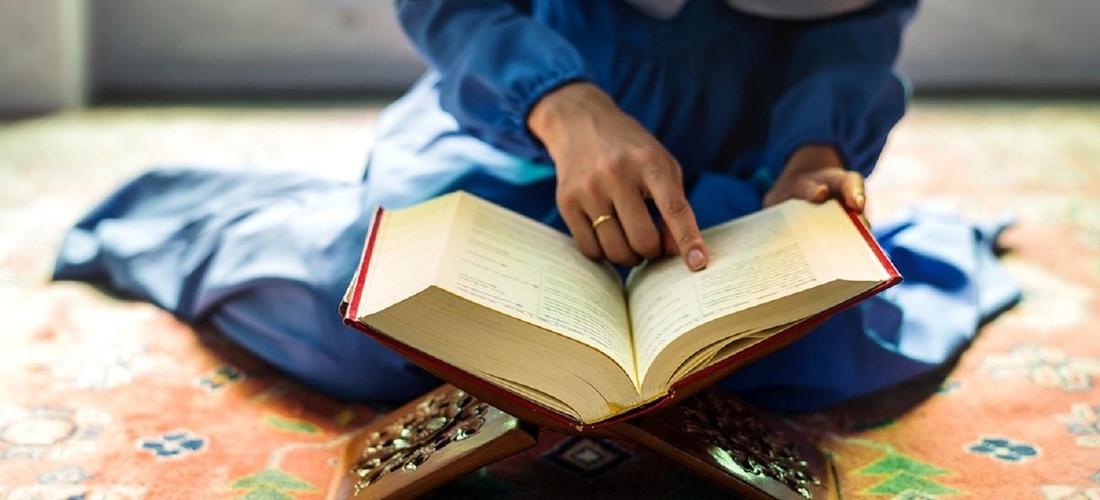Reflections from Surah Yusuf and How Its Verses Spark Comfort & Joy
Faith
|
Feb 23, 2021
|
8 MIN READ

Image source: Unsplash
Self care and self love mean so many different things to us. When was the last time you asked yourself what brings you joy, the kind of joy you can actively strive for in the here and now? Too often we forget to give importance to how we can seek love, care and joy from a spiritual perspective.
The words of Allah (S), the holy Quran, were sent down to he Prophet Muhammad (saw) at times in his life where he needed guidance on certain situations and circumstances, but also as a means of reassurance, hope and healing. These chapters and verses are also a means for us to reflect upon and decipher in order to find our own healing and comfort in the words of our creator. That is the theme of the Quran, allowing our hearts to lean in to the words of our Creator and finding ourselves in the stories being shared to extract our own hope, healing, comfort and reassurance.
One of my absolute favorite chapters in the Quran is, Chapter 12, Surah Yusuf. I can read this surah several times a week and still discover new meanings and correlations and be in awe at the strength of Prophet Yaqoub and Yusuf (blessings upon them) and the wisdom and divine planning of Allah (S). When my friend Samia Mubarak from Quranic Ocean announced that she would lead a class that explored this surah in depth, I immediately signed up.
I want to highlight for you some of my favorite verses that we’ve studied so far, share some insights, and discuss why these verses have been a source of hope, healing and joy for me.
A Short Background to Surah Yusuf
The story of Yusuf (as) was sent down to the Prophet Muhammad(saw) during the Year of Sorrow. It was a time of immense personal and community hardship for the Prophet and his companions. During this time, the Prophet (saw) was also confronted by a Jewish tribe that questioned his authenticity and prophecy. This is when Allah (S) sent down the entirety of Surah Yusuf, for the Prophet Muhammad (saw) as a means of hope and healing for him and his companions.
The next time you open up Chapter 12 and read the verses, I encourage you to build a connection with the surah depending on your own life situation. Allah (S) is talking to each of us through His divine words to help heal our wounds and bring happiness into our hearts again. We just have to ponder, and reflect.
For me, diving into this chapter has been a means of finding closure and comfort for the grief I have been enduring after losing two family members at the end of last year.

Image source: Pexel
Where to Place Blame
Qaala yaa bunaiya laa taqsus ru’yaaka ‘alaaa ikhwatika fayakeedoo laka kaidaa; innash Shaitaana lil insaani ‘aduwwum mubeen. (12:5)
"He (the father) said: 'O my son! Do not relate your vision to your brothers, or they may arrange a plot against you. Indeed! Shaytan (Satan) is to man a manifest enemy!'”
As my friend and teacher Samia said in our class, this verse displays such a profound parenting moment between Prophet Yaqoub (as) and his son Prophet Yusuf. By placing blame for the (possible) plan against Yusuf (as) on the shaytan, instead of on his brothers, Prophet Yaqoub (as) is nurturing the bond between Yusuf and his siblings as well as making him aware of the evil whispers of shaytan.
Throughout the surah we see that this concept of nurturing a healthy sibling bond by having a good assumption in them and attributing wrong actions to the whispers of shaytan affects Yusuf’s relationship with his brothers when he meets with them again years later and prepares him for the evil manifestations of the shaytan over the course of his life. As a mother, this verse really spoke to me and resonated with me instantly when dealing with my own children
For example, when one of my children lashes out against the other, instead of blaming that child, I now introduce the concept of shaytan and his evil whispers, the way he manipulates our actions when we are angry and upset. I tell them that shaytan makes us do things that are wrong, attributing the bad behavior to shaytan. The important part is use this to teach my kids to nurture their bond instead of creating hatred between
You are Never Alone
Falammaa zahaboo bihee wa ajma’ooo anyyaj’aloohu fee ghayaabatil jubb; wa awyainaaa ilaihi latunabbi ‘annahum bi amrihim haaza wa hum laa yash’uroon. (12:15)
"So, when they took him away, they all agreed to throw him down to the bottom of the well, and We inspired to him: 'Indeed, you shall (one day) inform them of their affair, when they do not know (you).'”

I love this verse for its detailed suspense that leads up to divine reassurance, something I can relate to so keenly. This verse was revealed to Prophet Yusuf (as) the moment he was thrown into the well by his brothers to reassure him that this is not the end for him, and that he will come out victorious and meet with his brothers again under different circumstances.
In this moment Allah (S) is comforting him with this verse to let him know that he is not alone. Allah (S) is with him always. He is with us always. This verse was also sent to reassure Prophet Muhammad (saw) as a source of validation that he will not be left alone with the disbelievers of Makkah, just as Prophet Yusuf (as) was not left alone in the well.
In our class, Samia connected this verse to the du’a we all so often recite: “O Allah, do not leave me in charge of my affairs even for a blink of an eye.” When we know with full conviction that Allah (S) is in charge of our affairs, we will be able to see His ability to send relief. Similarly, Hajar (as) was able to rely on her Creator in the middle of the desert with no water in sight to provide for her infant son Prophet Ismail (as).
Calling for Beautiful Patience
Wa jaaa’oo ‘alaa qamee shihee bidamin kazi’ qaala bal sawwalat lakum anfusukum amraa; fasabrun jameel; wallaahul musta’aanu ‘alaa man tasifoon. (12:18)
"And they brought his shirt stained with false blood. He said, ”No, your souls must have tempted you to do something evil. So (I can only endure with) beautiful patience. And it is Allah (Alone) Whose help I can seek to bear what you describe."
Every time I read this verse, I get goosebumps from how powerful Prophet Yaqoub’s (as) words are to his sons in this instant. Here is a parent who has just lost a child. In a moment of fear, disbelief and worry, he calls to Allah (S) for help and beautiful patience. I love this verse because it is as relatable to us today as it was to Prophet Muhammad (saw) as he was reading these verses at a time of immense hardship.
When we are hit with a calamity, we call to our Creator, who knows of our pain, and turn to Him for guidance. It is important that we take our own actions to move forward with grace when we are being tested. However, we must acknowledge that those actions alone are not what will get us through. Rather, relying on Allah (S) to help us find a way out along with taking action is key. He is truly Al Musta’an, whose help we seek.
Attribute Your Talents and Blessings to Allah (S)
Qaala laa yaateekumaa ta’aamun turzaqaaniheee illaa nabbaatukumaa bitaaweelihee qabla any yaatiyakumaa; zaali kumaa mimmaa ‘allamanee rabbee; innee taraktu millata qawmil laa yu’minoona billaahi wahum bil aakhirati hum kaafiroon. (12:37)
"He said, 'You will not receive food that is provided to you except that I will inform you of its interpretation before it comes to you. That is from what my Lord has taught me. Indeed, I have left the religion of a people who do not believe in Allah, and they, in the Hereafter, are disbelievers.'"

Prophet Yusuf (as) entered prison after the wife of the king tried to seduce him, and he refused her. While in prison, two prisoners seek interpretation of their dreams from him without knowing about his talent of dream interpretation. They just see him as one of those “of the doers of good,” a muhsin (12:36).
This verse is a teaching moment for anyone reading it in recognizing the source of your talents and blessings and attributing them to Allah (S), even in the hardest of circumstances. In our class, Samia pointed out that “When you continue to attach your blessings to the source of your blessings, you are in continuous shukr (thankfulness to Allah's (S) mode.”
It is in physical hardships and when we are tested that faith is boosted. Prophet Yusuf (as) was compelled to talk about Allah (S) and spread dawah at the first opportunity he got, even while in prison. He also immediately attributed his ability for dream interpretations to his Creator. “Recognizing your talents are God given, helps you use them for His creation,” Samia said to us in class.
Receiving Allah's (S) Mercy in Recognizing Your Wrong
Wa maa ubarri’u nafsee; innan nafsa la ammaaratum bissooo’i illaa maa rahima Rabbee; inna Rabbee Ghafoorur Raheem. (12:53)
“And I do not free myself from the blame. Indeed, the (human) self is inclined to evil, except when my Lord bestows His mercy. Indeed, my Lord is All-Forgiving, Most Merciful.”
In this verse, the wife of the king confesses to what happened earlier in the story when she tried to seduce Prophet Yusuf (as). Her heart has softened, and now Allah (S) is in the picture for her. She is God conscious. This verse is so powerful and grounding. Samia pointed out something truly amazing, saying "Any time your heart sees wrong and knows it is wrong, Allah (S) is casting His mercy on you.”
Take a moment and let that sink in. It is from His mercy that we are protected from harming ourselves. Samia also points out the two names of Allah (S) in this verse, Ghafoor (forgiving) and Raheem (merciful). They were not mentioned coincidentally. Rather, these two specific names were intentional for the situation described.
Oftentimes we are hard on ourselves. We don’t forgive ourselves and hold ourselves accountable in ways that may even harm our mental and spiritual health. Allah (S) on numerous occasions in the Quran tells us that He is here for us, to forgive us. His names are there for us to hold on to; they will help us go through our own hardships and trials on this Earth. They are a means of guidance for us in all aspects of our life.
What I love most about these verses, and so many other verses in the Quran, is that they were truly sent down as a mercy and moral compass for humanity. Regardless of the times, they are applicable and relatable. They bring our hearts much ease and comfort. Allow yourself to dive deep into their meaning and allow the Quran to bring joy into your life.
What surahs and verses of the Quran bring you comfort and joy? Share with us in the comments below!
Subscribe to be the first to know about new product releases, styling ideas and more.
What products are you interested in?

